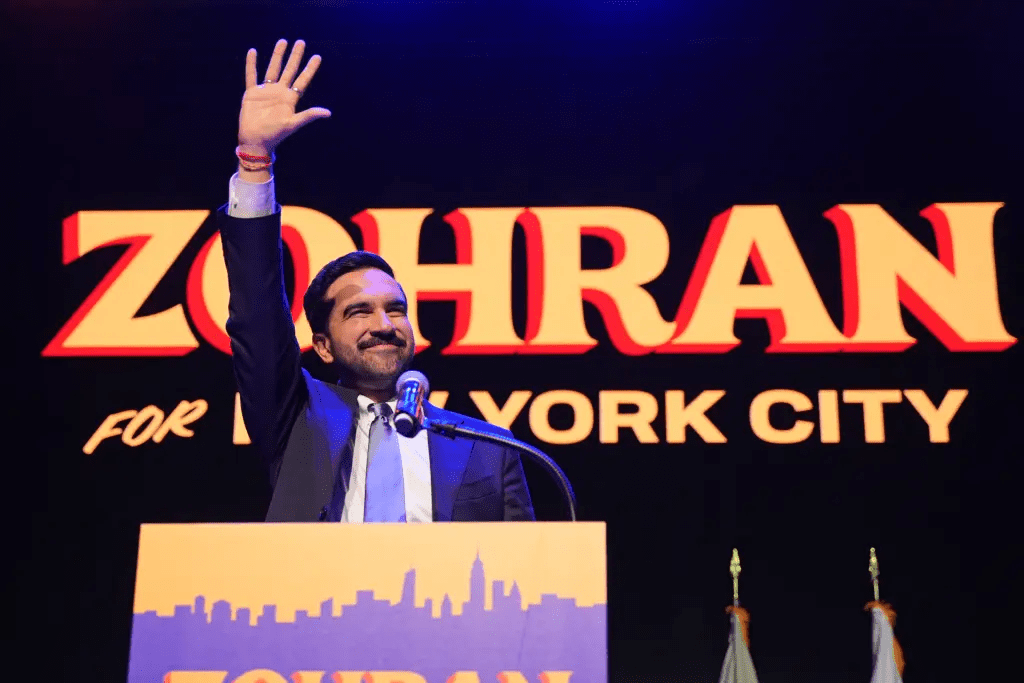Barstool Founder Dave Portnoy Blasts Mayor-Elect Zohran Mamdani as a “Communist”, Vows to Pull Manhattan Office After Shock Election Upset
The world of media and business found itself rattled this week when doughnut-and-ticker-tape kingpin Dave Portnoy, founder of Barstool Sports, publicly announced he is seriously considering moving his company’s Manhattan office in the wake of Zohran Mamdani’s stunning victory in the New York City mayoral race. The kind of statement that sounds like a press release from a boardroom, this one came from the lips of a social-media agitator turned business mogul, and it has set off a swirl of speculation about the relationship between business, politics and the city’s future. Portnoy, known for his unabashed and often abrasive style, did not mince words: he labelled Mamdani “a thirty-something year old Communist” and proclaimed he “can’t stand the thought of him running New York City.” Critics and commentators have watched closely as the pivoting world of digital media and Big City commerce intersected with the seismic shift in urban politics.

Barstool Sports, founded by Portnoy in 2003 and based in Manhattan for many years, has grown into an influential voice in sports, culture and commentary—reported to be worth about $600 million as of 2023. The company’s roots in New York, though partly moved to Chicago for its television arm, remain deeply tied to the city’s workforce and culture. But now, with Mamdani poised to become mayor after defeating former governor Andrew Cuomo in a decisive win earlier this week, Portnoy says he is “seriously weighing” an exit from Manhattan, telling finance staff to begin scouting property across the Hudson in Hoboken or Jersey City. The move, if executed, would serve as a vivid symbol of how ideological shifts can ripple into real estate decisions, corporate strategy and urban employment.
Portnoy’s tirade did not come out of the blue. Since the early days of Mamdani’s campaign, Portnoy has characterised the then-candidate as hostile to capitalism, inexperienced and anti-business. During a livestream two weeks ago, Portnoy warned the city was entering “a very scary time” should Mamdani take office, saying “he hates the police” and “he would blame the victims of 9/11 rather than the terrorists.” Those comments drew national attention and reflected a broader concern among some business leaders about the city’s trajectory. Mamdani, who describes himself as a Democratic socialist and ran on a platform of rent freezes, expanded public housing and city-run grocery stores, represented a clear departure from the establishment politics of New York City and a pivot toward affordability-first governance.

Inside New York’s economic community, reactions have already been divided. Some major players—like hedge-funder Bill Ackman—congratulated Mamdani and pledged support for the incoming mayor, citing the urgency of affordability and housing reforms. Others, however, voiced concerns about investment climate, tax policy and the possibility of a business exodus. Portnoy’s open threat to relocate isn’t just rhetoric—it underscores a tangible anxiety felt across sectors. One source inside Barstool noted the move wasn’t immediate, but exploratory: Portnoy said he has asked his team to look for “alternative office space no joke.” That kind of language has put the wider business network on notice that ideological alignment may now factor into where companies locate in major cities.
From Mamdani’s perspective, the response is an early terrain of the cultural battle that will define his term. His decisive win—bolstered by record youth turnout and a strong progressive coalition—heralds a new direction for New York City, one where affordability and structural change trump business-as-usual politics. But as Portnoy’s reaction illustrates, the new mayor will walk into an interface where commerce, media performance and city governance collide. The question now is whether Mamdani’s agenda will ease the tension or amplify it. Business leaders watching the situation say the next few weeks will be critical: how the new mayor communicates with corporate stakeholders and how policy signals align with investment confidence will shape the city’s economic future far more than campaign slogans.

Industry watchers also highlight that Portnoy’s comments, while dramatic, reflect a broader theme: the increasing power of individual voices in the corporate and local media space. In the multi-platform ecosystem where Barstool thrives—social media, podcasts, livestreams—a founder’s public declaration carries immediate resonance. For Portnoy, the decision to move his office is less about physical geography and more about alignment of culture and leadership. And New York, he seems to suggest, may no longer represent the kind of leadership he values. Whether other firms follow suit remains to be seen, but what’s clear is the spotlight is no longer only on politics—it’s on who stays, who goes, and what that means for a city in transition.
Amid all the drama, ordinary New Yorkers are trying to make sense of it. For employees at Barstool’s Manhattan office, questions have started: Will the relocation happen? Could their commute change? Will their day-to-day home base move out of the city they’ve rooted their careers in? From ride-share drivers to lunch-hour baristas, the potential ripple effects matter: it’s a reminder that local political shifts can reverberate into hourly lives and corporate decisions. For many, the tip of a spear moment may be a founder’s Instagram story or a social-media rant—but the real impact could be a building lease or a relocation offer.

As the story unfolds, there will be plenty of watching and waiting. Mamdani takes office amid immense expectations and high stakes. If he delivers on key policy promises—affordable housing, public-sector reforms and structural changes to economic life—the anxiety among business leaders may ease. If not, Portnoy’s threatened relocation may mark the first of several moves from companies rethinking New York as a headquarters. In that case, the narrative shifts: from one of political transformation to one of corporate exodus and urban reorientation. Either way, Portnoy’s statement will be remembered as a cultural moment—a founder publicly setting boundaries for his company’s future in response to electoral change.

In the end, the story isn’t just about one man’s dislike for another. It’s about city leadership, business confidence and where America’s financial engines choose to power up. Barstool’s threatened departure signals a crossroads for New York City—a place that has long been defined by its dynamism, its media energy and its global brand. Now it must ask whether its future lies in old alignments or in new paradigms.



